Skyrim is one of the biggest names of this console generation. It's already earned the status of "classic" in some circles. It's over three years old now, and I've been playing it (and its DLC) on my PS3 off and on for much of that time. I've been wanting to write a review, but I just never felt that I had progressed far enough into the game to have a full idea of its overall quality. Considering how long the game's been out, and how successful it's been both critically and commercially, this is more of a retrospective than a true review, since I'm not going to influence anybody's purchase decision. All I can do at this point is talk about what I think he game did right, and what it did wrong, so that future games can hopefully improve on the formula.
After years of playing, I've finally made enough progress with various characters to feel comfortable writing a review. With the recent rumors that Fallout 4 may reuse Skyrim's engine, I feel that this review actually has some relevance still.
The game also includes DLC, which I have reviewed separately in a another post.
The engine finally works! … Mostly …
It seems like Bethesda’s open-world game engine is finally maturing. It’s still a little rough around the edges and has its fair share of bugs and glitches (particularly pertaining to companion characters and home customization), but I was amazed when I realized that, for the first time with a Bethesda RPG, I had been playing the game for weeks without needing to consult the online wiki to find a work-around for a glitch that rendered any characters missing, quests inaccessible, or items missing! With Oblivion and the two Fallout games, it didn’t take more than a few hours of gameplay to start running into such glitches.
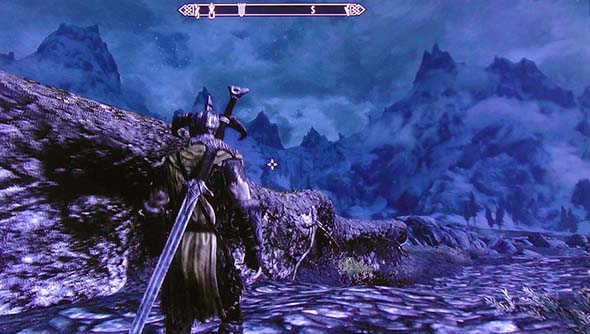
The large, open world is finally stable enough to be more fun than frustrating.
My roommate actually had a game-breaking glitch that prevented him from saving after the initial character creation (including auto-saves), so he lost a whole Saturday afternoon’s worth of progress and had to restart the game. That one was a doozy, and admittedly the worst bug that I've experienced so far in any Bethesda game! But these problems have been the exception rather than the norm.
So that’s one big check mark in Skyrim’s favor compared to previous Bethesda games!
Removing level-scaling makes leveling a reward rather than a punishment
Believe it or not, it wasn't the frequency of glitches that deterred me from finishing Oblivion; it was the level-scaling system. On paper it seemed like a good idea. Leveling up the enemies, quests, and loot so that the game is consistently challenging and rewards are consistently worthwhile sure sounded like a good idea!
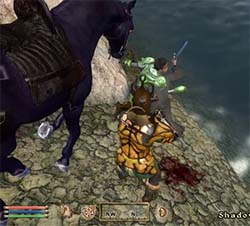
Oblivion's level-scaling resulted in a world overrun by trolls, glass-armored bandits, and Daedra.
But in practice, it turned out to be completely ruinous. Leveling felt more like a punishment than a reward, as everything in the world also became progressively harder. This issue was compounded by the poor balance between different classes. If you weren't leveling your combat skills, and had created a class built around - say - Mercantile, Athletics, and Acrobatics then you could easily over-level early in the game simply by walking around and talking to NPCs, only to get slaughtered in the first Oblivion gate because the enemies were stronger than you and you couldn't talk your way out of the fight.
Skyrim fortunately, does not retain Oblivion's strict level-scaling feature.
Some quests, enemies, and loot are scaled, but most things are not (or they're only slightly scaled). Now, bandits are always just bandits, overpowering enemies start the game overpowered, and the world does not suddenly become exclusively populated by trolls and Daedra halfway through the game. "Dungeon bosses" do seem to scale with the character’s level. As you start going up in levels, you’ll start to notice that the grunts in the dungeons are trivial to fight and leave worthless loot. You’ll actually feel like all that leveling has paid off! Then you get to the "boss" at the end of the dungeon and might get your ass handed to you and have to reload several times.
Hard areas should be hard, and easy areas should be easy. It's just mildly annoying that this game gives you no indication which it’s going to be until you’re already a mile underground, and the difficulty varies wildly - even within a single dungeon crawl.
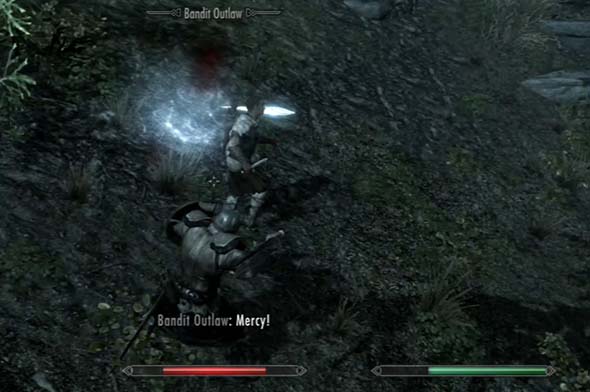
Most ambient encounters aren't scaled to the player's level, so bandits always remain just bandits.
Removing the class skills frees up the player to develop whatever skills he or she needs without the compulsion to micro-manage leveling class skills versus non-class skills. Character development feels much more natural and organic, and you can change your specialization at any time if circumstances change ... [More]
452deb1e-0838-4ffe-a6da-528d57ba6804|3|2.0
Tags:The Elder Scrolls, The Elder Scrolls V: Skyrim, Skyrim, Bethesda, RPG, action, fantasy, open world, dragon, dragonborn, magic, user interface, NPC, AI
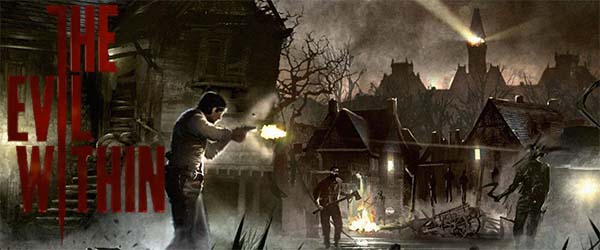
I had some really high hopes for The Evil Within. It looked like Shinji Mikami was trying to bridge a gap between the survival horror trappings of the original Resident Evil and the more action-oriented shooter gameplay style of Resident Evil 4. The former was a slower-paced game that emphasized open-ended exploration, puzzle-solving, and resource management in a horror setting. The latter game dropped most of its horror ambitions in favor of totally campy action shooter schlock. Early trailers for Evil Within looked it would hit a good balance between the two styles.
I didn't jump right on this game at release because I saw some mediocre reviews and heard that it failed to deliver on its promises. After booting up the game, waiting for an hour-and-a-half for the 4.7 GB update file to install (what did this update do? Tack on a whole new game?!), navigating the slick title menu, and then proceeding through the first few chapters, I verified that the game does indeed fail considerably as a horror game.
But it is worth noting that The Evil Within (unlike Resident Evil 4 and Shadows of the Damned) does seem to be making a legitimate attempt at being a horror game, rather than just an action shooter with zombies. It just doesn't really succeed at this goal.
Early levels in particular are full of exceptional lighting and ambient effects that really help to build an ominous atmosphere. The addition of stealth mechanics does put a greater emphasis on avoiding direct conflict and encouraging a more cautious approach (compared to RE4's guns-a-blazing attitude).
I've heard a lot of complaints that this game's story doesn't make sense and is stupid. I think most of these people didn't finish the game (or at least get to the point around chapter 10 where the story is explained). The story makes sense. The problem is that the game is very disjoint and never really builds on these foundations.
The game's narrative causes the character to jump (seemingly at random) from place to place - even within a single chapter. Each new place quickly starts to feel like a narrow-scope set-piece for an action scene rather than any kind of terrifying world. The game and individual chapters lack narrative cohesion and unifying design. There's very little opportunity for the game to allow open exploration or atmosphere-building, since the whole game feels like a collection of randomly-thrown-together set pieces and battle puzzles. So even though the overall story makes sense (in retrospect), the individual scene and level-progression doesn't.
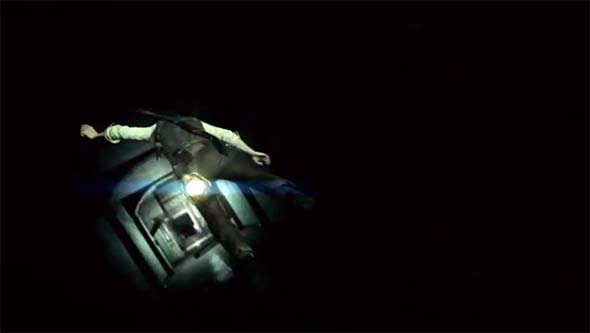
Reality is being warped, resulting in some trippy effects, but a very disjoint sense of progression.
The designers seem to be trying to mimic the Otherworld of Silent Hill, but the transition is so jarring, and the places feel so completely unrelated to one another, that it just doesn't work. You get through a pain in the ass, trap-infested maze while dodging monsters, only to be teleported to another maze area when you reach the exit! "OK, we're done with this area, let's just go to some other random challenge room." There's no sense of ever achieving anything because you're rarely ever allowed to actually go to the places that you are trying so hard to get to. And once that sense of futility sets in, any fear starts to dissipate. You're no longer concerned with getting out or saving yourself or even progressing the story because you realize that you can't achieve anything without the game giving it to you.
It's a real shame too, because some of these reality-warping mind tricks might be very effective if they were organically integrated into the flow of the game. I especially liked one bit in which a character falls down a bottomless pit, only to have the whole world re-orient itself so that the walls become the floor. So instead of falling to his death, he harmlessly rolls to a stop. Unfortunately, these effects lack subtly and feel random... [More]
ce16d91f-e2af-4e72-9f81-822136d27e6a|2|3.5
Tags:The Evil Within, Bethesda, Tango Gameworks, survival horror, action, shooter, stealth, Sebastian Castellanos, zombies, mental institution, Shinji Mikami, Resident Evil 4
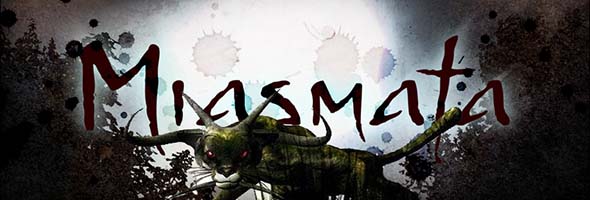
Although not a terrific game, the indie survival adventure game Miasmata (developed by Bob and Joe Johnson of IonFX) is an interesting title that does deserve to be played by its target audience. It's not a particularly challenging game, but players can back themselves up into seemingly insurmountable holes. Knowing the game's mechanics and rules - and knowing them early - is important to ensuring that you aren't forced to restart from the beginning or give up entirely.
Like with my previous strategy post for Alien Isolation, I am not going to provide specific walkthroughs for the game or any of its specific set piece challenges. In fact, doing so would be even harder than in Alien because Miasmata is a completely open-ended sandbox game. Instead, I will be offering some general-purpose tips that should be relevant for the entire game. This will include some techniques for working around the game's bugs and odd design flaws.
Owl statues point towards a cache of medicinal plants, but they do not count as landmarks or show up on the map.
This should be a pretty obvious tip. If you find the plants that are used for the 3 parts of the cure, or the three emphasis drugs, you should immediately pick them and ... [More]
12a74aef-1703-47e6-97c5-527408d0f4fe|1|5.0
Tags:Miasmata, IonFX, Bob Johnson, Joe Johnson, Steam, indie gaming, survival, action, adventure, horror, island, science, laboratory, specimen, sample, chemistry, map, compass, cartography, triangulation, torch, night, hallucination

While looking for new survival horror games on Steam, I stumbled onto a very intriguing title: Miasmata. During my holiday break from work, I decided to boot up the game and see if it scratched my survival horror itch.
It didn't, on account of not actually being a survival horror game. But what I found instead was an equally interesting premise that immediately caught my attention and piqued my curiosity.
The Johnson brothers kept this game about as simple as it could possibly be (perhaps to its detriment). They had a core concept, and they stuck to it. As such, Miasmata is a very novel game. It is probably the only game that I've ever played that is solely about scientific research.
The end goal is to cure a disease that the character has contracted and then escape the island. This disease acts as the central challenge to the game: you have to periodically medicate yourself in order to control the symptoms, but all medications must be derived from the local flora. Failure to do so can slow you down, blur your vision, and eventually kill you. A sheer majority of the game, thus, consists of wandering around the island collecting samples of plants, and then returning them to the nearest laboratory to examine them and use them to concoct various potions. In addition to medicines, you can also create potions to enhance your physical strength and perception. Doing so will allow you to run and swim further, and allow you to always know your location on the map (respectively).
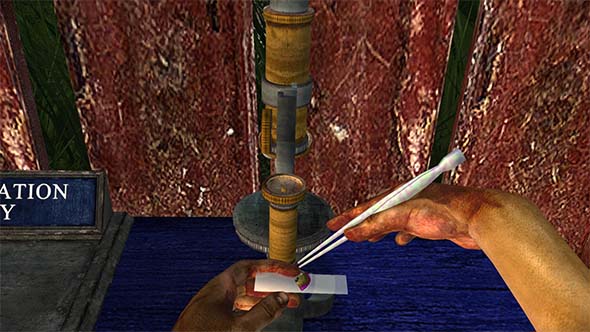
Stand back! I'm about to do SCIENCE!
Unfortunately, the process of analyzing the specimens is automated (via a skip-able cutscene). You don't actually have to do anything in order to figure out what the plant's effects are going to be, and no actual scientific knowledge is required by the player. Each plant also only has one effect, so the potion-making mechanic (which is the core of the game) is pretty shallow.
The effects of each plant will be noted in your journal, which is one of the best journal features of any game that I've ever played. It has a handy status page that includes pockets for storing your medicines, as well as holding your water flask. It also shows your objectives and has tabs to collected notes, your research results, and the map. The journal is also populated with hyperlinks that take you to the journal page with the relevant information. For example, if you find a note with ingredients for an objective drug, the status page will add a hyperlink to that note underneath the objective. It's every bit the journal that Silent Hill: Downpour wanted to have!
As you explore, you'll also find camps left behind by the deceased research team. These camps can contain notes that can reveal bits of backstory, provide recipes for various potions, or point you in the direction of key plant specimens. The camps also act as safe places for you to restock your supplies (including water), rest, and save your progress.
Keeping yourself hydrated and rested is important, as failure to do so can aggravate the symptoms of your illness and potentially kill you. Unfortunately, the feedback for this isn't terribly great. You'll get a notification when you're thirsty, but the game doesn't bother to tell you that you're tired. Instead, your health just starts rapidly deteriorating for no apparent reason. It took me a while to figure out that it was due to a lack of sleep.
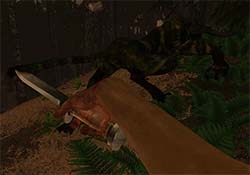
Combat mechanics are present,
but they don't have any affect.
A curious omission is that you don't have to eat. The game even includes various weapons scattered around the island, and there is an attack and throw command. But you can't attack the hostile panther-like creature that occasionally appears to hunt you, nor can you hunt and kill any of the game's various wildlife (beetles, squirrels, birds, and so forth). So you can only run and hide from the creature, and you only collect plants, which don't need to be attacked in order for specimens to be collected. So why are the weapons and attack mechanic even in the game?
Probably the second most significant mechanic is the map triangulation feature. Instead of revealing the map passively as you walk through it, the player must actively identify the location of landmarks ... [More]
d991856a-87f2-4dc9-8a5d-e20c1a004113|0|.0
Tags:Miasmata, IonFX, Bob Johnson, Joe Johnson, Steam, indie gaming, survival, action, adventure, horror, island, science, laboratory, specimen, sample, chemistry, map, compass, cartography, triangulation
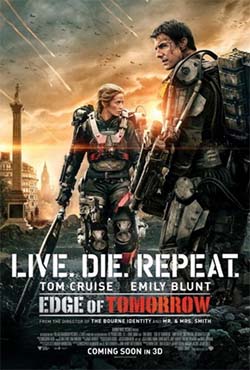
Edge of Tomorrow mimics video game respawning.
Video game adaptations have generally been pretty awful. Edge of Tomorrow isn't based on a video game (it's actually based on a Japanese novel), but it manages to feel more like a video game than any game-based movie that I've ever seen, while still providing an interesting and fun narrative built upon a unique time-travel premise.
The movie takes place in a present-day earth that has been invaded by hostile aliens, slowly but steadily consuming the cities of Europe, Asia, and the Middle East, and the combined forces of earth's nations can't slow them down. William Cage (Tom Cruise) is ordered into active combat in a surprise assault against the aliens, despite being a propaganda officer rather than an actual soldier. During the assault, the human soldiers are ambushed and slaughtered, but Cage manages to kill an alien only to be boiled alive by the alien's acidic blood. However, Cage gains the alien's ability to go back in time to reset the day after he dies. So when Cage dies, he immediately wakes up back at the army base just prior to the invasion to start the day over again.
Cage gets stuck in a "Groundhog Day" cycle, constantly reliving the same failed invasion over and over again. He tries to change the outcome, but plays such an insignificant role in the grand scheme of things that his efforts are all in vain, and he must repeatedly experience the invasion until he has effectively memorized every event. In each repeat cycle, he gets a little bit better at staying alive, just like a video gamer playing a trial-and-error level in an old-school video game (think Castlevania, Contra, Ninja Gaiden, or the more recent Demon's Souls). He learns the location of every alien, every mortar shell, every landmine, every piece of flying debris, until he can essentially walk through the invasion with his eyes closed either avoiding or eliminating threats with virtually no effort.
As a gamer, it was very interesting for me to watch a film narrative that is completely based around one of gaming's central conceits: respawning after a character dies... [More]
e065c317-ffa9-4e4f-9881-8ced624b0e35|1|5.0
Tags:Edge of Tomorrow, Tom Cruise, Emily Blunt, Warner Brothers, science fiction, action, time travel, alien, invasion, video game, death, respawn, trope, groundhog day
|

| 12 | | | | | | | 60 | | 11 | | | | | | | 55 | | 10 | | | | | | | 50 | | 09 | | | | | | | 45 | | 08 | | | | | | | 40 | | 07 | | | | | | | 35 | | 06 | | | | | | | 30 | | 05 | | | | | | | 25 | | 04 | | | | | | | 20 | | 03 | | | | | | | 15 | | 02 | | | | | | | 10 | | 01 | | | | | | | 05 |
|